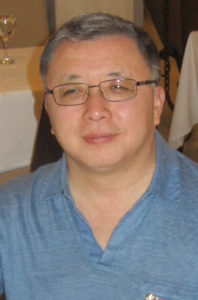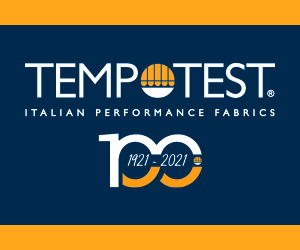China Took 20 Years to Become Manufacturing Force But Now Loses Ground to USA
March 15, 2018
SHANGHAI/USA—The wheels of the Chinese market have turned so much in the last 20 years that China has given some of the ground won in textiles back to the United States, according to David Li, a Chinese born entrepreneur who has been an American citizen for many years who now spends one third of his life on the road calling on customers for his company, HFI. He has a partner named Shen Jian who watches the Shanghai plant where the piecegoods and cut and sew kits are produced for HFI .
 David Li
“China has evolved from a third world, developing country to the dominant industrial power in the world.”
“Today, capital is more expensive in China; material is more expensive than it used to be and so is labor; the corporate tax rate in the USA at 21 percent right now is among the lowest in the world,” he says, pointing to what the Trump administration has done. “America will be stronger again in textiles in the future,” he feels based on the new economy. “We have a transparent and predictable legal system in the States. The cost of money in the States is now half of what we pay in China.”
“We are doing about $50 million worth of business today mostly in cushions, pillows and pet-beds. Why do consumers pay $29 for a seven-piece comforter set but are happy to spend $50 on a pet-bed?,” he asks Originally, Li was a major producer of bedding products but he found it was impossible to make money in this business so he shifted production to cushions, pillows and pet-beds for major big box retailers. His company HFI has one million square feet of manufacturing space in Shanghai. “We used to produce a seven piece comforter set that retailed at Walmart for $29!”
“Today, America is more attractive to me than China as a place to do business,” he says.
Add to this the fact that .com sales at retail are now pushing over 50 percent of sales and Li makes a case for getting closer to the market by being in the USA and offering quick delivery to online oriented retailers like Amazon, Wayfair and Walmart. Brick and mortar retailing is going through big changes right now.
“Five years ago, HFI was selling $30 million worth of bedding like this and making next to nothing on it. Today, we produce seven figures in bedding. We’d rather sell piecegoods whether its decking fabric for under $1 a yard or our top embroidery items for $20 in natural and polyester blends,” he reasons.
Li spent six years at Ametex, a piecegoods converter prior to starting his company in 1994.
Today, he is his own customer for much of the 300 million yards of fabrics he produces annually in Shanghai with six pigment printing lines that produce at the rate of 80 meters a minute; one flatbed printer, 10 heat transfer machines, 30 dye ranges. He buys double width greige goods for printing. He has just added 350,000 square feet to his Gaffney facility bringing it to a total of 600,000 square feet with an additional cost of $5.5 million that he is investing.
ADF, another division managed by Jack Cobb, also in Gaffney is supplying major furniture manufacturers with upholstery and decking fabrics. ADF is a major supplier to Ashley Furniture, both with China to China goods and to Ashley plants in the USA. “Ashley does China-to-China, China-to-Vietnam. Ashley is moving rapidly to Vietnam because of the lower costs there than China.”
A third division under the brand name ‘Quaker’ Fabrics operates out of Sao Paolo, Brazil under the watchful eye of Rodrigo Prieto. Quaker is selling fabrics from China, USA and Turkey, Li says with some fabric purchasing in India.
Li has been nimble and moved quickly to meet the market changes presented by the Chinese economy. Where he had 4,000 employees, he now has 1,000 employees and is highly automated. “We used to be able to pay employees $800 a year 20 years ago and today, we pay $20,000 a year per employee.”
The majority of what he produces in China are kits that are now sewn in Gaffney. Kits actually cost less duty to manufacture than piecegoods, he points out.
His sister is Shannon Li and she too is in home furnishings textiles under the name of Claridge. She is producing her products in David’s plants in Shanghai and the USA today, although she is an independent operator.
By Eric Schneider
David Li
“China has evolved from a third world, developing country to the dominant industrial power in the world.”
“Today, capital is more expensive in China; material is more expensive than it used to be and so is labor; the corporate tax rate in the USA at 21 percent right now is among the lowest in the world,” he says, pointing to what the Trump administration has done. “America will be stronger again in textiles in the future,” he feels based on the new economy. “We have a transparent and predictable legal system in the States. The cost of money in the States is now half of what we pay in China.”
“We are doing about $50 million worth of business today mostly in cushions, pillows and pet-beds. Why do consumers pay $29 for a seven-piece comforter set but are happy to spend $50 on a pet-bed?,” he asks Originally, Li was a major producer of bedding products but he found it was impossible to make money in this business so he shifted production to cushions, pillows and pet-beds for major big box retailers. His company HFI has one million square feet of manufacturing space in Shanghai. “We used to produce a seven piece comforter set that retailed at Walmart for $29!”
“Today, America is more attractive to me than China as a place to do business,” he says.
Add to this the fact that .com sales at retail are now pushing over 50 percent of sales and Li makes a case for getting closer to the market by being in the USA and offering quick delivery to online oriented retailers like Amazon, Wayfair and Walmart. Brick and mortar retailing is going through big changes right now.
“Five years ago, HFI was selling $30 million worth of bedding like this and making next to nothing on it. Today, we produce seven figures in bedding. We’d rather sell piecegoods whether its decking fabric for under $1 a yard or our top embroidery items for $20 in natural and polyester blends,” he reasons.
Li spent six years at Ametex, a piecegoods converter prior to starting his company in 1994.
Today, he is his own customer for much of the 300 million yards of fabrics he produces annually in Shanghai with six pigment printing lines that produce at the rate of 80 meters a minute; one flatbed printer, 10 heat transfer machines, 30 dye ranges. He buys double width greige goods for printing. He has just added 350,000 square feet to his Gaffney facility bringing it to a total of 600,000 square feet with an additional cost of $5.5 million that he is investing.
ADF, another division managed by Jack Cobb, also in Gaffney is supplying major furniture manufacturers with upholstery and decking fabrics. ADF is a major supplier to Ashley Furniture, both with China to China goods and to Ashley plants in the USA. “Ashley does China-to-China, China-to-Vietnam. Ashley is moving rapidly to Vietnam because of the lower costs there than China.”
A third division under the brand name ‘Quaker’ Fabrics operates out of Sao Paolo, Brazil under the watchful eye of Rodrigo Prieto. Quaker is selling fabrics from China, USA and Turkey, Li says with some fabric purchasing in India.
Li has been nimble and moved quickly to meet the market changes presented by the Chinese economy. Where he had 4,000 employees, he now has 1,000 employees and is highly automated. “We used to be able to pay employees $800 a year 20 years ago and today, we pay $20,000 a year per employee.”
The majority of what he produces in China are kits that are now sewn in Gaffney. Kits actually cost less duty to manufacture than piecegoods, he points out.
His sister is Shannon Li and she too is in home furnishings textiles under the name of Claridge. She is producing her products in David’s plants in Shanghai and the USA today, although she is an independent operator.
By Eric Schneider
 David Li
David Li















